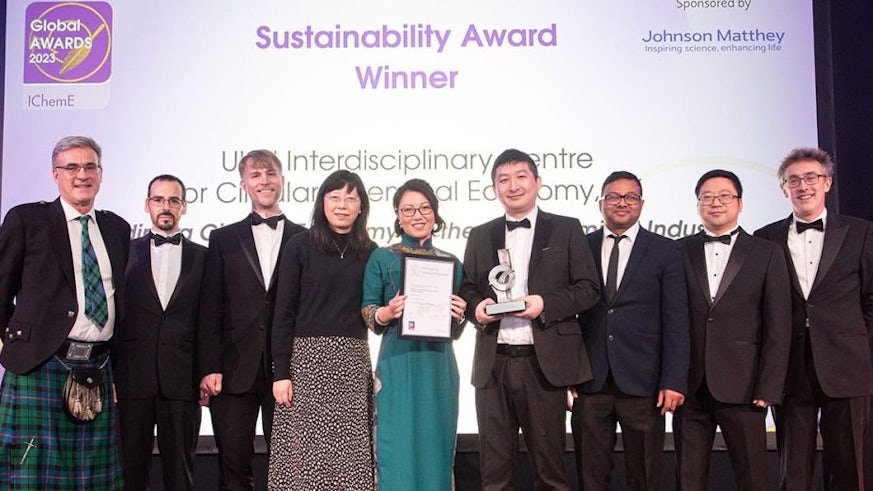Researchers recognised at IChemE 2023 Global Awards
20 December 2023

The Institution of Chemical Engineers (IChemE) Awards are widely recognised as the world’s most prestigious chemical engineering awards.
Dr Alberto Roldan Martinez, Senior Lecturer in Catalytic & Computational Chemistry, is part of the UKRI Circular Chemistry Team (CircularChem) that won the prestigious Sustainability Award, while the Max-Planck-Cardiff Centre on the Fundamentals of Heterogeneous Catalysis (FUNCAT) team based at the Cardiff Catalysis Institute was highly commended in the Research Project category.
Dr Roldan said: “We are honoured to receive the prestigious Sustainability Award from IChemE, a testament to the collective dedication and ingenuity of the CircularChem team and our valued partners. This recognition inspires us to continue pioneering sustainable solutions, driving positive change and fostering a circular economy for a better, greener future”.
CircularChem is taking a leading role in addressing the national and global challenges of reducing carbon emissions. It brings together stakeholders from academia, industry, government, NGOs and the general public to transform the UK’s £32 billion chemical industry into a sustainable circular economy.
The team aims to achieve resource security not only within the chemical industry, but also in a wider range of sectors and communities that use, distribute, and recycle chemical-based products. To achieve this, they have developed a roadmap for a Circular Economy of Chemicals including research on enabling technologies, process integration and whole system optimisation, together with addressing the political, societal and financial aspects.
As well as winning the Sustainability Award, CircularChem were also finalists in the Team category.
The FUNCAT team were highly commended in the Research Project Category.
Lead author of the study, Dr Richard Lewis, said: “We are delighted our work has been recognised by IChemE for its potential to precipitate a sea-change in industrial oxidation chemistry. Our technology clearly shows how through close academic and industrial collaboration chemical production can be made fit for the 21st Century, ensuring the efficient use of finite resources".
In collaboration with partners UBE Corporation and Shanghai Jiao Tong University, the team has developed a brand-new method of creating cyclohexanone oxime - a major precursor to the plastic material Nylon-6.
A key construction material used in the automotive, aircraft, electronic, clothing and medical industries, global Nylon-6 production is expected to reach around 9 million tonnes per year by 2024, prompting scientists to search for greener, more sustainable ways of producing cyclohexanone oxime.
Currently, cyclohexanone oxime is produced industrially through a process involving hydrogen peroxide, ammonia and the catalyst titanosilicate-1. The hydrogen peroxide needs to be concentrated, shipped and then diluted before use in a chemical reaction, effectively wasting large amounts of energy.
The technology developed by the Cardiff team generates hydrogen peroxide in-situ, rivalling the performance of the current industrial approach, and has, for the first time, decoupled the synthesis of a major commodity chemical from the industrial route to hydrogen peroxide achieving significant reductions in material costs and greenhouse gas emissions.
The award ceremony took place at the end of November, showcasing the achievements of organisations and teams around the world that demonstrate excellence in chemical, biochemical and process engineering.
